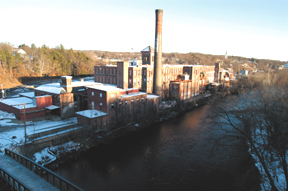Developers are planning to transform the old Ashton Mill complex in Cumberland, an Industrial Revolution-era cotton mill in Blackstone Valley, into 200 one- and two-bedroom rental apartment units scheduled to open in late spring or summer in 2004.
Forest City Enterprises, Inc., a Cleveland, Ohio-based real estate firm, announced its purchase of the 200,000-square-foot mill late last month. The plan to rejuvenate and reuse the historic Ashton Mill, located on Front Street on the Blackstone River, is one of a number of mill projects in Rhode Island and southeastern Massachusetts that have been designed to breathe new life into the states’ outdated industrial areas.
“It recycles an old mill and that’s important in terms of taking an old piece of property and putting it toward a good use,” said Cumberland Mayor Daniel J. McKee. “From a historical perspective, it’s located in an important area, and to have that overlooking [the Blackstone River] only enhances the developments along the river.”
Construction and development on the Ashton Mill, built around 1878, is expected to cost just under $33 million, according to John G. Weigel, vice president of residential development in Forest City’s Boston division, and construction is scheduled to begin in January 2003. Completion of the project is expected to take about 18 months.
“We do expect a lot of interest” in this complex, he said. “It’s an important project in terms of historic preservation.”
Weigel said the mill will retain its current façade, with minor improvements and restorations such as opening the 4-by-10-foot windows that were covered by the previous owner, restoring and repairing the exterior brickwork, demolishing a number of small outbuildings, and rehabilitating the old mill tower, as well as the bell it contains.
The new leasing and management office will be located in the area of the building where the old water wheels, which brought power to the turbines, used to be. Weigel said the floor plan will allow visitors to look down and see the old turbines, which are still in place.
“It’s in good shape,” Weigel said of the building. “The owner enclosed most of the windows, so we’ll be opening them, but we’re going to restore the building to the way it appeared at least at the beginning of the 20th century.”
Because the building is on the National Register of Historic Places and because it has been well maintained over the years, Weigel said the majority of the restoration and rehabilitation work will take place on the inside. Apartments will be loft- and traditional-style, one- and two-bedroom units, ranging in size from 700-1,200 square feet. Weigel said Forest City has also worked with the state and federal governments, as well as Rhode Island Housing to provide residents with a number of affordable apartments, which will account for 20 percent of the units.
Owned by the Lonsdale Company as a cotton mill until the late 1940s, the Ashton Mill played a major role in 19th century textile technology and was the site of the first large-scale test of the high-speed Sawyer spindle, one of the earliest of its kind developed in the United States. After the company went out of business, the mill changed hands a number of times but was owned for the longest period by Owens Corning’s Fiberglass Manufacturing, from 1950-1985, Weigel said. It was most recently owned by Industrial Factory Rentals, he said.
Rental rates for the one-bedroom apartments will range from $1,100 to $1,200 a month, and two-bedroom rates will run at $1,600 a month, Weigel said. Residents who qualify for the affordable apartments will most likely pay $500 per month for a one-bedroom and $600 a month for a two-bedroom apartment, the developer said.
Renters will benefit from an amenity package, he said, which will include use of the fitness center, large dining area and common living spaces that will be part of the apartment complex.
“It will be a really nice place to live,” he said. “It’s not your standard, white-box, three-story, walk-up flat, and I think you’ll find it’s something people [will] enjoy.”
In fact, with its 14-foot ceilings, exposed beams and brick walls, large windows, historic architecture and scenic views, Weigel said mills like this one offer a kind of living space that modern apartment complexes cannot.
“People do like the unique character of these old buildings,” he said. “The architecture and the way it was built – you can’t recreate that.” And with its proximity to Providence – an 11-minute drive – and to Route 95 and Route 295, as well as numerous businesses, Weigel said it is also a convenient place to call home.
McKee said that in addition to further beautifying the river’s edge, the Ashton Mill rehabilitation will have a positive impact on Cumberland’s property tax rates.
Forest City has established itself as a restoration real estate firm, transforming a number of buildings in the country including a former World War II officers’ barracks and President Eisenhower’s summer retreat into loft apartments in Denver and one of New England’s busiest bakeries, where the first Fig Newton was made in 1891 in Boston, into the Kennedy Biscuit Lofts.
“It’s a very positive business,” Weigel said of restoring old buildings. “It’s a very green business. You’re making something new out of something old and essentially are recycling old buildings.
“I think it’s going to be a very successful project,” he said. “It’s in a great spot.”
For the complete current issue, visit our subscription Web site, or call (401) 273-2201, ext. 227 or 234.













